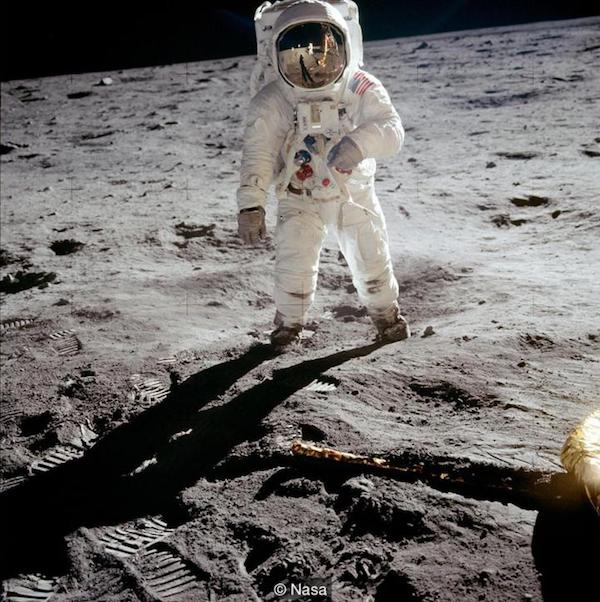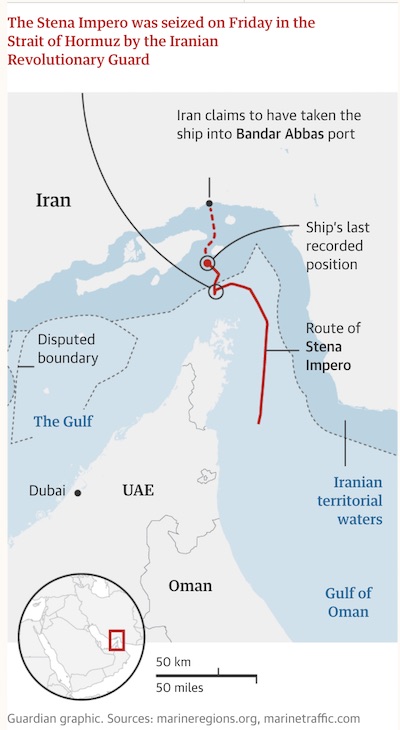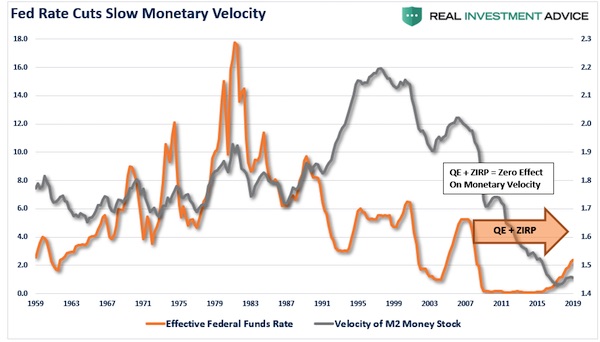
Buzz Aldrin photographed by Neil Armstrong, who’s reflected in his visor

A lot about Britain today, with a new PM being announced on Tuesday and taking over from Theresa May on Wednesday. And that at a point in time when the country has committed its biggest international blunder in years (though competition’s stiff) with the seizure of an Iranian oil tanker two weeks ago.
• The Ham of Fate (Fintan O’Toole)
The Leave campaign that Johnson led to a stunning victory in the Brexit referendum of June 2016 owed much of its success to its carefully calibrated slogan “Take Back Control.” Akrasia, which is discussed in depth by Socrates, Plato, and especially Aristotle in the Nicomachean Ethics, is the contrary of control. It means literally “not being in command of oneself” and is translated variously as “weakness of will,” “incontinence,” and “loss of self-control.” To Aristotle, an akratic is a person who knows the right thing to do but can’t help doing the opposite. This is not just, as he himself seems to have intuited, Boris Johnson to a tee. It is also the reason why he embodies more than anyone else a Brexit project in which the very people who promised to take back control are utterly incapable of exercising it, even over themselves.
To grasp how Johnson’s akratic character has brought his country to a state approaching anarchy, it is necessary to return to the days immediately before February 21, 2016, when he announced to an expectant throng of journalists that he would support the Leave campaign. This was a crucial moment—polls have since shown that, in what turned out to be a very close-run referendum, Boris, as the mayor of London had branded himself, had a greater influence on voters than anyone else. “Character is destiny, said the Greeks, and I agree,” writes Johnson in The Churchill Factor, his 2014 book about Winston Churchill, which carries the telling subtitle “How One Man Made History.”
While the book shows Johnson to be a true believer in the Great Man theory of history, his own moment of destiny plays it out as farce, the fate of a nation turning not on Churchillian resolution but on Johnsonian indecision. For Johnson was, in his own words, “veering all over the place like a shopping trolley.” On Saturday, February 20, he texted Prime Minister David Cameron to say he was going to advocate for Brexit. A few hours later, he texted again to say that he might change his mind and back Remain. Sometime between then and the following day, he wrote at least two different columns for the Daily Telegraph—his deadline was looming, so he wrote one passionately arguing for Leave and one arguing that the cost of Brexit would be too high. (Asked once if he had any convictions, Johnson replied, “Only one—for speeding…”)

Nothing wrong with leaving the EU, but everything wrong with how it’s been executed.
• Brexit, or Project Fear (Lis)
If, during the 2016 referendum campaign, you had told voters that MPs would be scrambling to stop the prime minister shutting down the legislature in order to force through food shortages, mass job losses and a crash in the pound, someone might have needed to change the slogan on the side of that bus. What is happening right now in Britain goes beyond any previously conceivable limits of responsible or accountable governance. Viewed against the country which seemed to exist just a few years ago, it is quite literally unbelievable. It’s not just that Brexit is a case of “I told you so”: the harm to our national political fabric has been more catastrophic than even the most pessimistic Remainer could have contemplated.
Britain is now heading into immediate, unabated crisis, but the consequences could last for years or even decades. Even the most conservative estimates suggest damage to our economy in all circumstances if we leave, contrary to everything campaigners promised. The neutral Office for Budget Responsibility this week forecast a significant recession in the event of no-deal. But the economic damage will almost certainly take less time to repair than the damage to our politics and society. What was billed as a way for people to take back control of democracy has become a systematic attack on every institution which underpins it.
First the Brexiters came for political opponents. Any prominent Remainer who dared question the legitimacy of the referendum or, heaven forbid, suggested a new one in the light of changed circumstances, was branded a traitor, an enemy of democracy, an elitist, a Remoaner, someone who wanted to subvert the will of the people, someone who knew best, someone who hated Britain. It was devastatingly effective. Brexit’s leaders rapidly and comprehensively refigured democratic opposition as opposition to democracy. All potential opponents, particularly in parliament itself, were cowed into affirming “respect for the result.” It became a standard vow of allegiance to a movement they knew to be disastrous, and they had little choice but to make it.

“The legality of the UK seizure of a tanker heading for Syria with oil from Iran intrigues me. One refers to EU sanctions against Syria, but Iran is not a member of the EU. And the EU as a principle doesn’t impose its sanctions on others. That’s what the US does.”
• The Story Began With UK’s Seizure Of Iranian-Flagged Ship In Gibraltar (O.)
The morning after a group of 30 Royal Marines helped seize the Iranian-flagged Grace 1 in Gibraltar, tired Foreign Office officials did not look exactly jubilant. There was not exactly a sense of foreboding, but diplomats were aware of the wider bilateral consequences for British-Iranian relations. Now, with the capture of a British-owned oil tanker in the Gulf, some of their worst fears have been realised. The Stena Impero and its crew of more than 20 are now in the hands of the Iranian Revolutionary Guards – and the UK has been shown to be unable to protect British shipping going through the waterways of the strait of Hormuz.
The British insist that they only impounded Grace 1 due its suspected destination – a port in Syria – not due to the fact that the ship was carrying Iranian oil. European Union sanctions against the regime of Bashir al Assad regime were there to be enforced and international law upheld, the British argued. There seemed little doubt, given its circuitous route, that the ship was bound for Syria. Yet there were some oddities to the British decision. Few previous shipments of oil to Syria have been impounded. The Spanish claim that the British acted under the instruction of the Americans. The Trump administration is trying to freeze all Iranian oil exports as part of its policy of maximum economic sanctions designed to force the Iranians to reopen talks on the nuclear deal signed in 2015.
But Britain opposes that US policy, arguing that it is counterproductive and only likely to strengthen the hands of hardliners in Tehran. Carl Bildt, the former Swedish prime minister and co-chair of the European council on foreign relations, pinpointed the ambiguities of the British action in Gibraltar: “The legality of the UK seizure of a tanker heading for Syria with oil from Iran intrigues me. One refers to EU sanctions against Syria, but Iran is not a member of the EU. And the EU as a principle doesn’t impose its sanctions on others. That’s what the US does.”

He didn’t lure Britain, but a handful of intellectually challenged posh kids. And anyway it’s far too easy to blame this on Bolton. They did it themselves, May and Hunt et al.
• Bolton Lured Britain Into A Dangerous Trap To Punish Iran (G.)
John Bolton, White House national security adviser and notorious Iraq-era hawk, is a man on a mission. Given broad latitude over policy by Donald Trump, he is widely held to be driving the US confrontation with Iran. And in his passionate bid to tame Tehran, Bolton cares little who gets hurt – even if collateral damage includes a close ally such as Britain. So when Bolton heard British Royal Marines had seized an Iranian oil tanker off Gibraltar on America’s Independence Day, his joy was unconfined. “Excellent news: UK has detained the supertanker Grace I laden with Iranian oil bound for Syria in violation of EU sanctions,” he exulted on Twitter. Bolton’s delighted reaction suggested the seizure was a surprise.
But accumulating evidence suggests the opposite is true, and that Bolton’s national security team was directly involved in manufacturing the Gibraltar incident. The suspicion is that Conservative politicians, distracted by picking a new prime minister, jockeying for power, and preoccupied with Brexit, stumbled into an American trap. In short, it seems, Britain was set up. The consequences of the Gibraltar affair are only now becoming clear. The seizure of Grace I led directly to Friday’s capture by Iran’s Revolutionary Guards of a British tanker, the Stena Impero, in the Strait of Hormuz. Although it has not made an explicit link, Iran had previously vowed to retaliate for Britain’s Gibraltar “piracy”. Now it has its revenge.


I’m pretty sure that’s not true, but it doesn’t matter. Moreover, Spain says Gibraltar is not British either.
• British Letter to UN Says Iran Approached Tanker In Omani Waters (R.)
Britain told the United Nations Security Council on Saturday that a British-flagged tanker seized by Iran was approached by Iranian forces when it was in Omani territorial waters and the action “constitutes illegal interference.” “The ship was exercising the lawful right of transit passage in an international strait as provided for under international law,” Britain’s U.N. mission wrote to the Security Council. “International law requires that the right of transit passage shall not be impeded, and therefore the Iranian action constitutes illegal interference.” The letter, seen by Reuters, was also sent to U.N. Secretary-General Antonio Guterres.
Friday’s action in the global oil trade’s most important waterway has been viewed in the West as a major escalation after three months of confrontation that has already taken Iran and the United States to the brink of war. It follows threats from Tehran to retaliate for Britain’s seizure on July 4 of the Iranian tanker Grace 1, accused of violating sanctions on Syria. “Current tensions are extremely concerning, and our priority is to de-escalate. We do not seek confrontation with Iran,” the letter read. “But it is unacceptable and highly escalatory to threaten shipping going about its legitimate business through internationally recognized transit corridors.” Britain called on Iran to release the Stena Impero tanker and told the Security Council it was working to resolve the issue through diplomatic means.


Ha ha. You mean there are sanctions that haven’t been applied yet?
• Britain Mulls Sanctions In Response To Iran Tanker Seizure (R.)
British ministers are making plans aimed at targeting Iran with sanctions in the aftermath of the Iranian seizure of a British-flagged oil tanker in the Gulf, the Daily Telegraph newspaper reported. British Foreign Secretary Jeremy Hunt is expected to announce on Sunday diplomatic and economic measures, including potential asset freezes, as a response to the incident, according to the report. Britain could push for United Nations and European Union sanctions to be reimposed on Iran after they had been lifted in 2016 following a deal on Iran’s nuclear program, the Telegraph reported.

This is about weaponry, but I’d suggest the UK is mentally too weak.
• UK Too Weak To Address Strategic Threats, Warns MP Committee (O.)
The government has repeatedly failed to invest in defence and security, leaving the UK struggling to cope with emerging threats, an influential parliamentary committee was due to warn on Sunday in a report thrown into sharp relief by the developing crisis in the Persian Gulf. The Joint Committee on the National Security Strategy says the next prime minister will have to tackle major challenges – from growing strains on the UK’s relationship with the US and the EU, to the rise of China – if the UK is to meet its defence ambitions.
“If the Government wants to turn the ‘Global Britain’ concept into a meaningful strategy for a positive and self-assured role for the UK after its departure from the EU, then it needs to be more honest about how it proposes to address these challenges,” said the committee chair, Margaret Beckett MP. “It must also back this up with the necessary funding and resources, especially for defence and diplomacy.”
The report’s publication comes after the former chief of defence staff, Lord Richards, warned that the Royal Navy was “just too small to have a significant effect without being with allies”. Speaking in response to the seizure of a British-flagged oil tanker by Iranian authorities, Richards told BBC radio’s Today programme: “The fact is, for whatever reason, our government has invested relatively little against the threat and the risks that we face, particularly more and more in the longer term.” The former first sea lord, Lord West of Spithead, told Sky News that the navy had “too few ships” to escort merchant vessels in dangerous waters.

@Jack has gone into politics. Bad move.
• Twitter Blocks Accounts Of Iranian State Media Outlets (AFP)
A day after Twitter suspended the accounts of several Iranian state media outlets, the social networking service said Saturday it acted after harassment of people linked to the Baha’i faith. Amid soaring tensions in the region, heightened by Iran’s seizure on Friday of a British-flagged tanker, some of the affected media outlets had speculated that the suspensions were related to their coverage of the seizure. But Twitter cited what it said was the coordinated and targeted harassment of people linked to the Baha’i faith, a religious minority that has long faced persecution in Iran. It did not name the suspended accounts, and said it was continuing to investigate the matter.
“Account suspended. Twitter suspends accounts which violate the Twitter Rules,” read English-language messages on each of the Iranian media outlets’ accounts. Mehr news agency, which is close to moderate conservatives in Iran, said its Farsi-language account appeared to have been blocked late Friday following its reports on the seizure of the tanker Stena Impero in the strategic Strait of Hormuz. Iran’s Revolutionary Guard said it seized the Swedish-owned tanker for breaking “international maritime rules” in the strait, a chokepoint for around a third of the world’s sea-borne oil. Mehr’s Farsi-language Twitter page was inaccessible on Saturday, along with those of the official IRNA news agency and the agency of the Young Journalists’ Club.

Wednesday July 24, big day: Boris becomes British PM and Bob Mueller’s circus comes to town.
• Mueller Should Be Arrested For Conspiracy To Overthrow Trump (PCR)
The Mueller report, which had no choice as there was no evidence, but to clear Donald Trump of conspiring with Russian President Putin to steal the last US presidential election from Hillary Clinton, nevertheless managed to keep an aspect of the manufactured hoax known as “Russiagate” alive by indicting some Russian intelligence officers and a Russian Internet clickbait operation for attempting to discredit Hillary with Internet postings. At the time I noticed that Muller’s indictments were based only on his assertion and not on any evidence. As there was no prospect whatsoever of the fake indictments coming to trial, I did not comment on them. I focused instead on Mueller’s statement that Trump might have obstructed justice although he lacked evidence to support the charge.
I noted how corrupt American law has become when it is possible to obstruct justice in the absence of a crime. Democrats and presstitutes were determined to get Trump by any means and remain uninterested in how justice is obstructed when there is no crime. In retrospect, not picking up on Mueller’s indictment-by-hearsay of Russians was a mistake. Not only have the Democrats continued their Russiagate campaign on the basis of the unsubstantiated indictments, but, more importantly, the indictments-by-assertion-alone show Mueller’s total lack of moral character. A prosecutor, indeed a former Director of the FBI, who confuses his unsubstantiated allegation with evidence, is not only a person devoid of any respect for law, but also an extremely dangerous person to have been vetted for the high government positions that he has held.


Or is that the Liberals?
• Are Libertarians the New Neocons? (Daniel McAdams)
There is a disturbing trend in some libertarian circles and among some libertarian organizations to be increasingly enamored with foreign interventionism and US government backed regime change overseas. For those focused on foreign affairs, this is particularly troubling as it is abandoning a key tenet of libertarianism: non-interventionism. Not “your government 6,000 miles away must be changed… but I don’t support the US military doing it.” That is not non-interventionism. Non-interventionism is accepting that others may wish to live in a way you may not approve of. Non-interventionism in your neighbor’s affairs – whether he enjoys reading the Bible or lighting up a marijuana cigarette (or maybe both) – is really the sine qua non of the libertarian mindset: “aint nobody’s business if you do.”
You do not aggress against your neighbor just because you disagree with his life choices that do not infringe on your person or property and you extrapolate that dynamic to where you demand that to the highest extent possible your local, state, and federal governments treat you as you would treat your neighbor. The idea that this critical impulse somehow becomes null and void when it comes to international affairs is truly bizarre. In fact many self-described libertarians full-throatedly cheer when people are in the streets thousands of miles away trying to overthrow their governments. Somehow from this far distant vantage point they are just convinced that the mythical “free state” is about to break out somewhere.
And when someone points out that the semi-hidden hand behind these uprisings is the US government, which seeks to create overseas governments of subservient elites to prop up the (anti-libertarian) US empire, they accuse that person of being an extremist or a conspiracy theorist…or they get really lazy and stupid and just claim you are a “supporter” of the dictator of the day. So, many US libertarians (who knew next to nothing about Venezuela) demanded our support for that great “libertarian” liberator of Venezuela, Juan Guaido, who turned out to be just another crook with zero support from Venezuelans (but a lot of support from the CIA!).

Dmitry, from a Russian perspective, shining his light on what I’ve repeatedly said: the US makes weapons for profit, Russia makes them to defend itself (from US weapons).
• War Profiteers and the Demise of the US Military-Industrial Complex (Orlov)
Within the vast bureaucratic sprawl of the Pentagon there is a group in charge of monitoring the general state of the military-industrial complex and its continued ability to fulfill the requirements of the national defense strategy. Office for acquisition and sustainment and office for industrial policy spends some $100,000 a year producing an Annual Report to Congress. It is available to the general public. It is even available to the general public in Russia, and Russian experts had a really good time poring over it. In fact, it filled them with optimism. You see, Russia wants peace but the US seems to want war and keeps making threatening gestures against a longish list of countries that refuse to do its bidding or simply don’t share its “universal values.”
But now it turns out that threats (and the increasingly toothless economic sanctions) are pretty much all that the US is still capable of dishing out—this in spite of absolutely astronomical levels of defense spending. Let’s see what the US military-industrial complex looks like through a Russian lens. It is important to note that the report’s authors were not aiming to force legislators to finance some specific project. This makes it more valuable than numerous other sources, whose authors’ main objective was to belly up to the federal feeding trough, and which therefore tend to be light on facts and heavy on hype. No doubt, politics still played a part in how various details are portrayed, but there seems to be a limit to the number of problems its authors can airbrush out of the picture and still do a reasonable job in analyzing the situation and in formulating their recommendations.
What knocked Russian analysis over with a feather is the fact that these INDPOL experts (who, like the rest of the US DOD, love acronyms) evaluate the US military-industrial complex from a… market-based perspective! You see, the Russian military-industrial complex is fully owned by the Russian government and works exclusively in its interests; anything else would be considered treason. But the US military-industrial complex is evaluated based on its… profitability! According to INDPOL, it must not only produce products for the military but also acquire market share in the global weapons trade and, perhaps most importantly, maximize profitability for private investors. By this standard, it is doing well: for 2017 the gross margin (EBITDA) for US defense contractors ranged from 15 to 17%, and some subcontractors—Transdigm, for example—managed to deliver no less than 42-45%. “Ah!” cry the Russian experts, “We’ve found the problem! The Americans have legalized war profiteering!”

“I doubt the former Special Counsel will ever sit in that hot-seat.”
[..] the party’s pathetic attempt to revive the walking dead narrative of RussiaGate is not working too well down on Jerold Nadler’s House Judiciary Committee. The chairman apparently discovered that his star witness, Robert Mueller, might have to answer some embarrassing questions about the conduct of his investigation — like, why did it go on for two years when his chief deputy, Mr. Weissmann, was informed from the get-go that the main predicate document was a fraud? So, Mr. Mueller’s turn in the witness chair keeps getting postponed clear into the August recess. I doubt the former Special Counsel will ever sit in that hot-seat. If I was him, I sure wouldn’t do it voluntarily. Oh, did anyone notice the House staged an impeachment vote on Wednesday? It flopped too.
Finally, there is the walking time-bomb known as Jeffrey Epstein, Democratic Party poohbah and impresario of an underage sex racket featuring the “Lolita Express” airplane service to his private “Orgy Island” in the Caribbean, with auxiliary party shacks in New York City and the New Mexico Desert. Rogue reports have been styling Epstein’s doings as an international blackmailing operation associated with the CIA and other Intel outfits, including the UK’s MI6 and Israel’s Mossad, for the purpose of keeping international bigshots on a short leash. Who knows? At the center of it all is former President Bill Clinton, listed twenty-six times on the Lolita Express’s flight manifest — though the ex-Prez said last week in a statement that it was only four times. (Consider the source.) A raft of unsealed documents in the matter has been court-ordered to drop any day, and power-players all over the world — especially in our nation’s capital and on Wall Street — are rumored to be chewing their fingernails down to the nubbins as they wait for it.


















